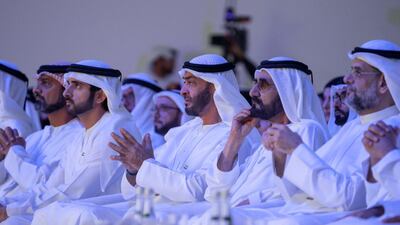Next week the UAE gears up to celebrate its 48th National Day. It is a time for festivity as the occasion provides an opportunity to reflect on the achievements of a nation that has made rapid strides in just half a century of its existence and has matured well beyond its years. An oasis of political stability, religious tolerance and technological advancements in a largely restive neighbourhood, the UAE has for decades been home to citizens from all over the world and from all walks of life, who have come seeking greater opportunities and a better life for themselves. Indeed, there is much to be proud of for the nation as a whole. And yet there can be no room for complacency in an ever-changing world either.
It is for this reason that every year since 2017, its leaders have been convening at the UAE Government Annual Meeting to discuss the future direction of the country. The timing of the two-day summit is apt as it is held the week before National Day. Beyond its obvious symbolism, the date falls at the end of the year – thereby giving its stakeholders a timeframe within which to take stock of their accomplishments and make resolutions. More than 500 officials from federal and local government authorities are discussing how the UAE's infrastructure could be developed over the next 10 years. Also on the agenda is government preparation for the country's centenary celebrations in 2071, the first phase of which will be developed and implemented over the next decade. At the summit, officials outlined 11 ways to improve life in the Emirates, ranging from boosting tourism to embracing the digital economy and delivering better care for children.
The annual meeting is impressive in its ambition and scope – but it also crucial as a road map for the future. For one, it reflects the government’s ability to take the long view on several issues – such as planning for a post-oil future – at a time when its counterparts around the world are finding it increasingly difficult to plan far ahead, given deep divisions prevalent in society. Issues such as globalisation and trade – ideas that once received wide consensus across political divides in the West – are now being hotly debated and are consequently complicating policymaking efforts. Furthermore, authorities in many countries – both in the developed and emerging world – have been inadequately prepared for disruptions brought about by new technologies and climate change.
In stark contrast, leaders in the UAE have been able to create a national framework for local initiatives, such as Abu Dhabi's Ghadan 21 and the Dubai Plan 2021 – government programmes designed to improve the respective emirates' competitiveness in various aspects of life, from business to innovation. This reflects the realisation that the country, while being a federation of seven emirates, makes even greater progress by marching in lockstep. It is this unity among its stakeholders that will ensure not just the durability but also the continued prosperity of the nation.

